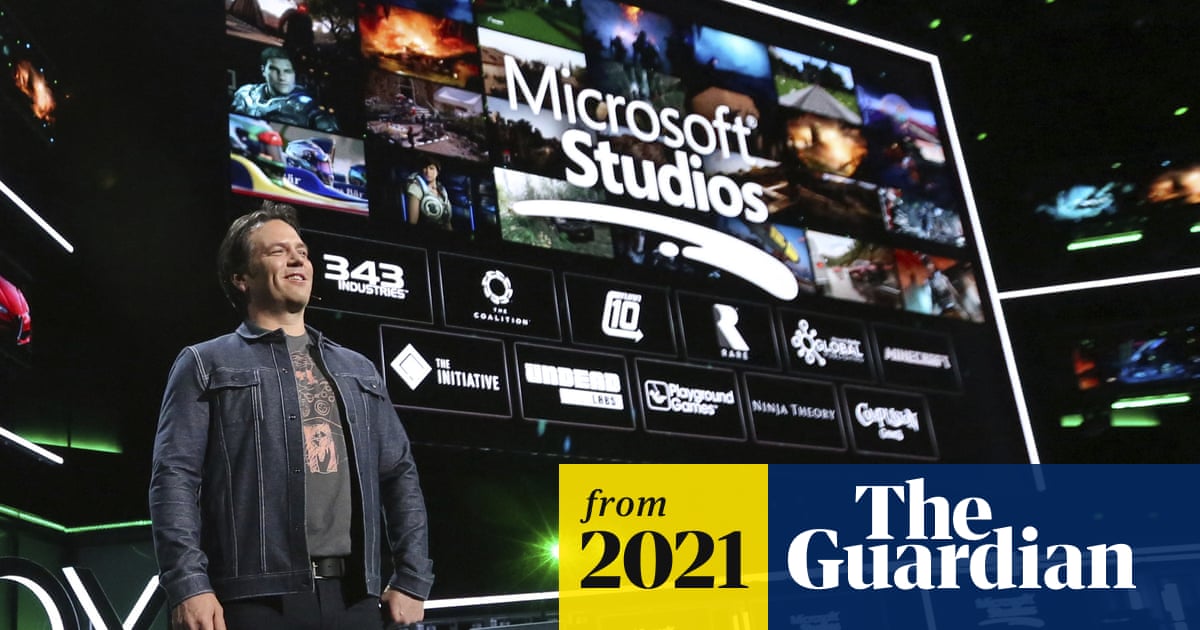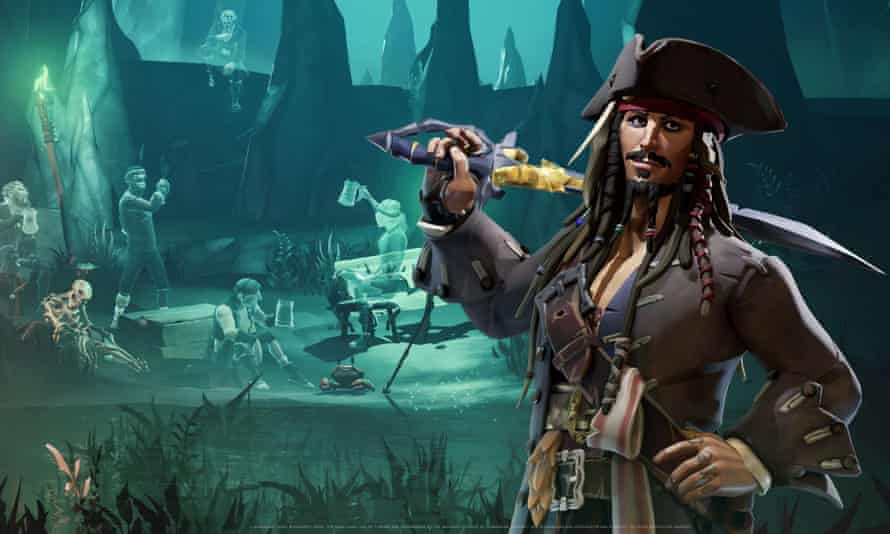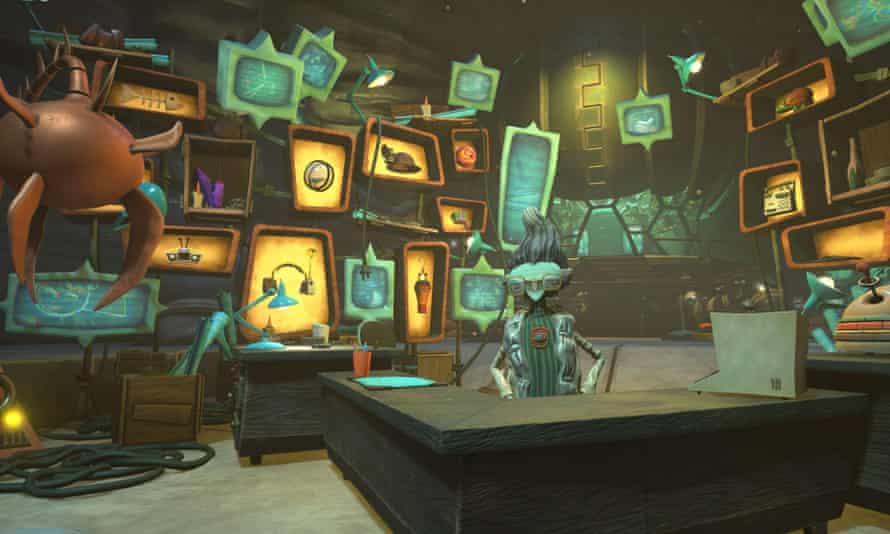Narrate away if old.

 www.theguardian.com
www.theguardian.com
ver the last decade, the concept of “games as a service” has revolutionised the way the interactive entertainment industry works. From the subscriptions introduced by massively multiplayer online adventures such as World of Warcraft to the seasonal battle passes of current online shooters, we’re seeing a huge amount of focus on games that can sustain a lucrative community of players over several years.
But where does that leave more offbeat ideas and concepts that couldn’t support years’ worth of play? Where does it leave the single-player narrative adventure – the blockbusting genre that brought us titles such as Metal Gear Solid, Red Dead Redemption and Mass Effect? It’s a genre Sony has supported through funding the studios that make games such as The Last of Us, Spider-Man and God of War. But Microsoft has focused its efforts on cross-platform, connected games, as symbolised by the mammoth Minecraft industry. Is there still room for traditional forms of narrative games on the Xbox Series X?
“I think we’re probably building more of those now than we’ve been in the history of Xbox,” says Xbox chief Phil Spencer. “Platform holders, whether that platform is subscription or a hardware device or a store, are actively investing in new and probably more risky things, because, if it works, we get value out of bringing players into the ecosystem.”

A lasting impact ... Sea of Thieves: Captain Jack Sparrow. Photograph: Microsoft
The thing is, building a gigantic self-contained narrative game is riskier now than it has ever been. To get a team of hundreds of developers working for several years on a project requires a budget in the hundreds of millions of dollars – and, unlike an evolving game such as Sea of Thieves or No Man’s Sky, you get one shot at making an impact with a narrative adventure. However, Spencer sees an opportunity in using modern platforms and technologies to test out ideas and build a community of fans before release. At last month’s E3 trade show, Microsoft revealed that it was planning to combine Game Pass with its streaming technology xCloud, allowing users to try demos of titles before downloading and playing them.
Advertisement
Spencer also sees the opportunity to bring an early access type service to Xbox Series S/X, allowing owners to try out new titles while they’re still being made. The company has already experimented with this model on console through its game preview scheme, but that has been extremely limited. xCloud could change that. “When we can stream to any device – a PC, or could be a phone – we can really look at how we make more of these kinds of early access [experiences], even as a funding model for creators sometimes,” he says. “I think it can open up a tighter relationship between creator and consumer … Creators are a huge focus for us right now.”
By “creators”, Spencer doesn’t just mean game developers – he’s also talking about players’ contributions to the games they love, such as those who design and sell or share things with others on the Minecraft, Forza and Flight Simulator marketplaces. “Microsoft has been a creator-led company from the beginning,” he says. “I mean, on DOS, anybody could build an app – you were a game publisher if you had a compiler and a floppy drive. You just built your game, copied it over to a floppy, put it in a Ziploc and you’re selling; you’re a game publisher. I like that access and I want to get back to that as an industry.”

Forza Horizon 5 is set to offer significant opportunities for player-generated challenges. Photograph: Microsoft
Advertisement
Matt Booty, head of Microsoft Studios, agrees. “I think we will see a lot of games start to include things that are based around scripting and the ability to add to the game,” he says. “With Forza Horizon 5, we added the ability to design challenges and obstacle courses. We’ve had Halo Forge, which lets you design your own multiplayer levels. In Flight Simulator, that activity is a lot more sophisticated. So I think we’ll see that going forward, where people just have an expectation that they can do more through scripting and mods. And certainly, with the addition of Bethesda to the Xbox family, they’ve got a long history of understanding how mods work – we’ve seen that with Skyrim.”
Booty says there is no single overriding approach to game development under Microsoft, nor groupthink approach to design. Although the company has talked a lot about evolving games, and retention and subscription models, not every game is going to get a season pass. “We don’t have any direction or mandate that says every game has to be an ongoing, sustained game. Take [surrealist platforming game] Psychonauts: there might be a Psychonauts 3, but I’m not going to tell [designer] Tim Schafer to go make it. Knowing the history of games that he makes, I don’t think he’s going to be making a game that has seasons and goes on for five years,” he says.
“Sea of Thieves has longevity and we’re going to have Halo multiplayer start to be based around seasons, but Compulsion Games, our studio in Montreal, weren’t told to go build something that’s going to have seasons or six pieces of DLC or something. Tell Me Why was an important story for us to get out there, but there is no mandate that they’ve got to go figure out how to do seasons for that game.”

Psychonauts 2 … there will be no pressure from Microsoft to produce a season pass. Photograph: Microsoft
Both Spencer and Booty are also very clear that if video games are going to expand their audience into new demographics and territories, they will need to tell new stories – and that will require new types of studios, in new places. Does this mean Microsoft might purchase a studio in India, Africa or South America? “It would actually surprise me if that doesn’t happen,” says Spencer. “Just knowing the talent that’s available, and the tools [such as game engines Unity and Unreal] that are so much more accessible … I would be surprised if in the next three to five years, you don’t see numerous studios in places that aren’t the traditional hubs of video game development.”
Advertisement
Booty agrees. “There should be a several-hundred-person studio [in one of these territories],” he says. “And not for outsourcing or support, but a team building whatever the version of the best blockbuster game may be for that market. That is very much the vision.”
Spencer’s mantra has always been to put the player at the centre of the business. So, if players still want to play offbeat, idiosyncratic games or giant narrative adventures that can’t translate into multi-year franchises, platform holders must support them. The new tools of the contemporary industry – streaming from the cloud subscription models, marketplaces full of things that players have created – must all be subservient to game ideas. It’s games, not business models, that we all look for when we switch on a console and think about what to play.

Phil Spencer on the future of Xbox: we still want to take risks with games
While developing traditional narrative games is harder than it has ever been, Microsoft’s Xbox chief sees an opportunity in using modern platforms and tech to tell new stories
ver the last decade, the concept of “games as a service” has revolutionised the way the interactive entertainment industry works. From the subscriptions introduced by massively multiplayer online adventures such as World of Warcraft to the seasonal battle passes of current online shooters, we’re seeing a huge amount of focus on games that can sustain a lucrative community of players over several years.
But where does that leave more offbeat ideas and concepts that couldn’t support years’ worth of play? Where does it leave the single-player narrative adventure – the blockbusting genre that brought us titles such as Metal Gear Solid, Red Dead Redemption and Mass Effect? It’s a genre Sony has supported through funding the studios that make games such as The Last of Us, Spider-Man and God of War. But Microsoft has focused its efforts on cross-platform, connected games, as symbolised by the mammoth Minecraft industry. Is there still room for traditional forms of narrative games on the Xbox Series X?
“I think we’re probably building more of those now than we’ve been in the history of Xbox,” says Xbox chief Phil Spencer. “Platform holders, whether that platform is subscription or a hardware device or a store, are actively investing in new and probably more risky things, because, if it works, we get value out of bringing players into the ecosystem.”

A lasting impact ... Sea of Thieves: Captain Jack Sparrow. Photograph: Microsoft
The thing is, building a gigantic self-contained narrative game is riskier now than it has ever been. To get a team of hundreds of developers working for several years on a project requires a budget in the hundreds of millions of dollars – and, unlike an evolving game such as Sea of Thieves or No Man’s Sky, you get one shot at making an impact with a narrative adventure. However, Spencer sees an opportunity in using modern platforms and technologies to test out ideas and build a community of fans before release. At last month’s E3 trade show, Microsoft revealed that it was planning to combine Game Pass with its streaming technology xCloud, allowing users to try demos of titles before downloading and playing them.
Advertisement
Spencer also sees the opportunity to bring an early access type service to Xbox Series S/X, allowing owners to try out new titles while they’re still being made. The company has already experimented with this model on console through its game preview scheme, but that has been extremely limited. xCloud could change that. “When we can stream to any device – a PC, or could be a phone – we can really look at how we make more of these kinds of early access [experiences], even as a funding model for creators sometimes,” he says. “I think it can open up a tighter relationship between creator and consumer … Creators are a huge focus for us right now.”
By “creators”, Spencer doesn’t just mean game developers – he’s also talking about players’ contributions to the games they love, such as those who design and sell or share things with others on the Minecraft, Forza and Flight Simulator marketplaces. “Microsoft has been a creator-led company from the beginning,” he says. “I mean, on DOS, anybody could build an app – you were a game publisher if you had a compiler and a floppy drive. You just built your game, copied it over to a floppy, put it in a Ziploc and you’re selling; you’re a game publisher. I like that access and I want to get back to that as an industry.”

Forza Horizon 5 is set to offer significant opportunities for player-generated challenges. Photograph: Microsoft
Advertisement
Matt Booty, head of Microsoft Studios, agrees. “I think we will see a lot of games start to include things that are based around scripting and the ability to add to the game,” he says. “With Forza Horizon 5, we added the ability to design challenges and obstacle courses. We’ve had Halo Forge, which lets you design your own multiplayer levels. In Flight Simulator, that activity is a lot more sophisticated. So I think we’ll see that going forward, where people just have an expectation that they can do more through scripting and mods. And certainly, with the addition of Bethesda to the Xbox family, they’ve got a long history of understanding how mods work – we’ve seen that with Skyrim.”
Booty says there is no single overriding approach to game development under Microsoft, nor groupthink approach to design. Although the company has talked a lot about evolving games, and retention and subscription models, not every game is going to get a season pass. “We don’t have any direction or mandate that says every game has to be an ongoing, sustained game. Take [surrealist platforming game] Psychonauts: there might be a Psychonauts 3, but I’m not going to tell [designer] Tim Schafer to go make it. Knowing the history of games that he makes, I don’t think he’s going to be making a game that has seasons and goes on for five years,” he says.
“Sea of Thieves has longevity and we’re going to have Halo multiplayer start to be based around seasons, but Compulsion Games, our studio in Montreal, weren’t told to go build something that’s going to have seasons or six pieces of DLC or something. Tell Me Why was an important story for us to get out there, but there is no mandate that they’ve got to go figure out how to do seasons for that game.”

Psychonauts 2 … there will be no pressure from Microsoft to produce a season pass. Photograph: Microsoft
Both Spencer and Booty are also very clear that if video games are going to expand their audience into new demographics and territories, they will need to tell new stories – and that will require new types of studios, in new places. Does this mean Microsoft might purchase a studio in India, Africa or South America? “It would actually surprise me if that doesn’t happen,” says Spencer. “Just knowing the talent that’s available, and the tools [such as game engines Unity and Unreal] that are so much more accessible … I would be surprised if in the next three to five years, you don’t see numerous studios in places that aren’t the traditional hubs of video game development.”
Advertisement
Booty agrees. “There should be a several-hundred-person studio [in one of these territories],” he says. “And not for outsourcing or support, but a team building whatever the version of the best blockbuster game may be for that market. That is very much the vision.”
Spencer’s mantra has always been to put the player at the centre of the business. So, if players still want to play offbeat, idiosyncratic games or giant narrative adventures that can’t translate into multi-year franchises, platform holders must support them. The new tools of the contemporary industry – streaming from the cloud subscription models, marketplaces full of things that players have created – must all be subservient to game ideas. It’s games, not business models, that we all look for when we switch on a console and think about what to play.





